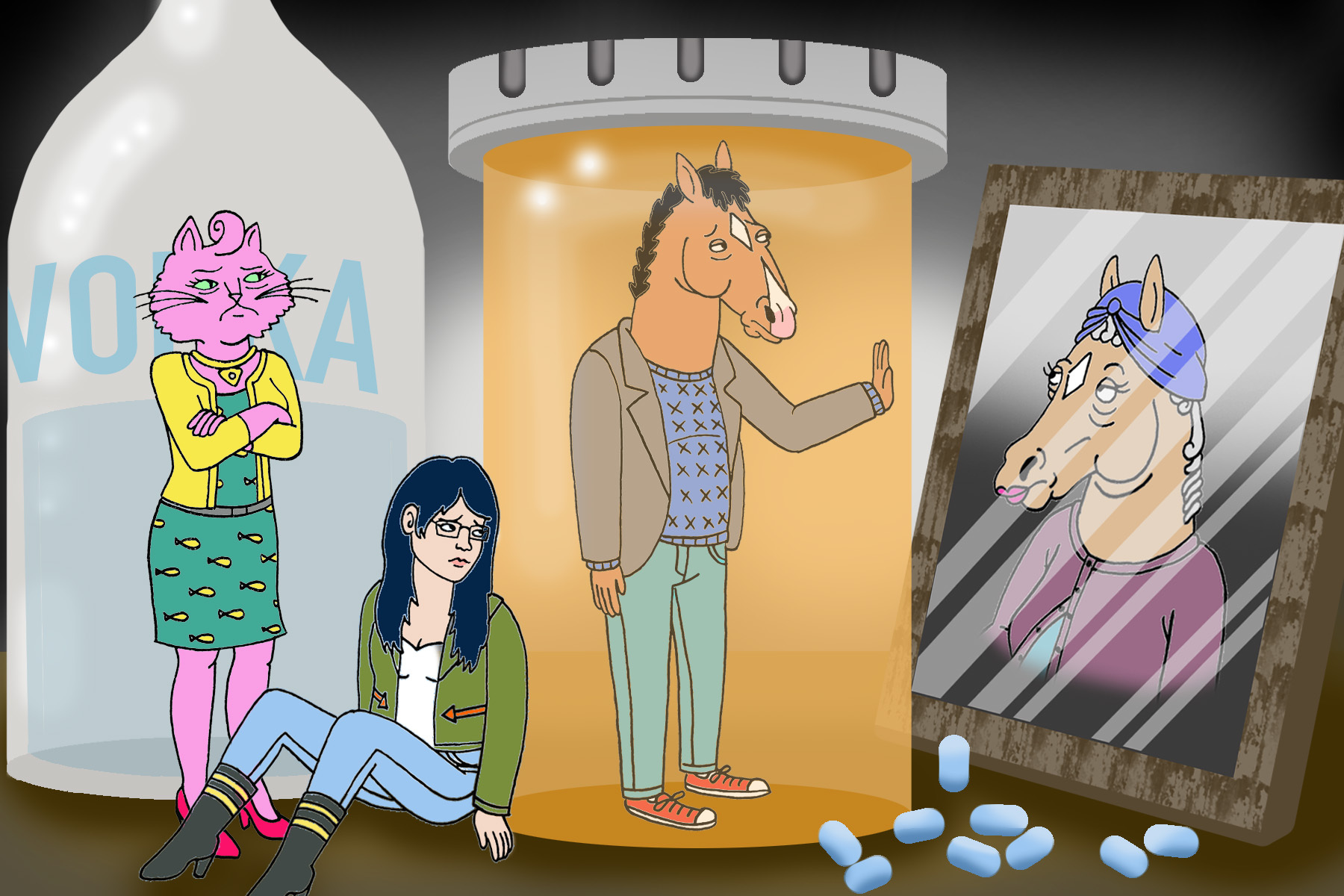Content Warning: Suicide
Typically, when you see a show with a title like “Bojack Horseman,” you don’t expect it to belong to the “deep and meaningful” genre. However, a brief watch shows the brilliance of its storytelling as it subtly exposes the dark realities of Hollywood through carefully performed satirical moments. Before examining what makes this show such a brilliant watch, it’s important to know the history behind the creation of such a great program.
It all started when cartoonist Lisa Hanawalt and creator Raphael Bob-Waksberg met during an audition for their high school theater department. They would share drawings and joke about what kind of TV shows they would make, not really thinking anything of it. According to Waksberg, “ I don’t think either of us assumed we would one day be actually professionally making a cartoon together”.
Waksberg headed to New York for college while Hanawalt was off to art school in Los Angeles, but they stayed in touch and worked together on the creation of a Web Comic titled “Tip Me Over Pour Me Out.” A few years down the line, an animation studio asked Waksberg if he had any ideas for an animated series, to which he responded by going to Hanawalt’s website, printing out a few of her sketches, and making up a narrative to go with those characters.
Hanawalt was hesitant to get involved at first, but ended up becoming the main character designer and a co-director for the show, which, after careful consideration, was given the name “Bojack Horseman.” For Hanawalt, being able to work in the animation industry as a woman was quite challenging, as there were few opportunities as well as an overall lack of respect for female animators.
As for the casting process, it was vital for the creators and producers to find the right actors for a show of this caliber, but trying to pitch a show about a depressed and alcoholic horse was not the easiest task in the world. The casting department was able to land famed actors Will Arnett and Aaron Paul, of “Arrested Development” and “Breaking Bad” respectively.
When asked about the scripting process, Paul went on to say, “Raphael explained to me that he wanted to not only do a cartoon that was funny, but also a cartoon that was incredibly tragic at times. I thought that was such a brave, cool idea.” Additionally, in an interview with Vulture, Arnett added, “I knew Raph was funny the moment I read the first pilot presentation. It wasn’t until a few episodes in that I realized just how deep he was prepared to dive.”
Arnett and Paul’s affiliations with the popular Netflix programs “Arrested Development” and “Breaking Bad” made the pitching and green-lighting process at Netflix much easier. Main producer Micheal Eisner is to thank for this, as his name recognition alone as a famed producer was able to draw these highly-acclaimed actors and producers to the project.
To understand the brilliance of the show, we must first look at the overall premise and what the producers intended to accomplish. The show is set in modern-day Hollywood and focuses on the life of ex-sitcom star Bojack Horseman (Arnett). Horseman’s depression and alcoholism lead him down a path riddled with bad decisions. Despite Bojack’s dark and skewed view of the world, the show is bitingly funny. It centers on comedy while simultaneously making you shed a tear or two. The producers want you to get emotional. “Bojack Horseman” will have you laughing uncontrollably one moment and reaching for the tissue box the next, and that’s what makes it so great.
The first two seasons follow Bojack’s attempt to return to relevance with an autobiography. He’s assigned a ghostwriter, Diane Nguyen (Allison Brie), who turns out to be one of the most crucial characters in the entire show. Bojack intends for the book to chronicle his everyday life and divulge why people should care about him, but he soon discovers that Diane is really writing about his awful behavior and his distorted worldview, which somehow makes the book incredibly popular.
However, soon after the book’s release and subsequent success, Bojack discovers that his ex-producer and former best friend, Herb, is on his deathbed with cancer. Bojack never connected with Herb after he was fired by the network, and when Bojack tries to apologize, Herb refuses to accept it. The former friends fail to make up and they end up in a wrestling match on the floor before Bojack is kicked out of Herb’s home. Lost relationships and missed chances for reconciliation hit hard.
Unfortunately for Bojack, we see a lot of these dark moments throughout the show, but the way it tackles tough topics such as suicide and addiction is quite remarkable. One good example would be Bojack following in the footsteps of his childhood hero Secretariat, a rich and famous horse who ended up committing suicide, by portraying him in a movie that ultimately revitalizes his career.
Though the show contains many themes, one that stands out is forgiveness. Although Bojack had a bad childhood and a tough road to stardom, he fails to take accountability for his actions and always plays the victim, leading to more and more hurt until, finally, it’s too much. Bojack realizes that in order to forgive or be forgiven, he must first forgive himself. The brilliance of Bojack Horseman is often overlooked but its emotional depth is worthy of its critical acclaim.

















